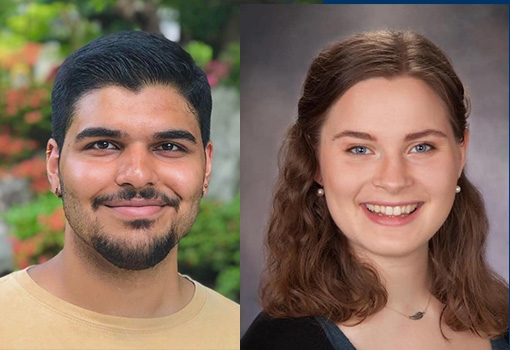Two materials PhD students at UC Santa Barbara, Bailey Rhodes and Tanay Tak, have received 2023 National Defense Science and Engineering Graduate (NDSEG) Fellowships, a prestigious honor from the U.S. Department of Defense (DoD). The fellowship provides three years of full tuition, fees, health insurance, and an annual $40,800 stipend. Rhodes and Tak were among the 165 individuals from 68 institutions nationwide awarded NDSEG Fellowships this year.
“I am grateful to the many mentors who have invested in me throughout my educational trajectory,” said Rhodes, a third-year PhD student. “Relationships with my mentors and collaborators have allowed me to access and develop all of the necessary skill sets to bridge conventionally disparate fields and apply new insights to conventional problems. Going forward, the NDSEG Fellowship will give me the freedom I need to implement my own ideas in the design of next-generation materials.”
Developing high-strength, yet light-weight materials for use in the transportation industry is crucial toward improving engine efficiency and minimizing costs. Out-of-the-box thinking is required to significantly improve these well-established alloys by developing control over the parameters that contribute to their strength. As part of her sponsored research project, Rhodes will implement an interdisciplinary approach to use magnetism to engineer alloys having advanced mechanical properties. Rhodes, who is co-advised by materials professors Dan Gianola and Irene Beyerlein, says that working with an experimental group and a computational group within the department has prepared her for this project.
“By applying experimental inputs to the computational phase-field model used by my research group, I have developed a computational framework to understand magneto-mechanical coupling in high-strength materials, in tandem with experiments,” said Rhodes, whose previous honors include the Heeger Fellowship and two National Science Foundation’s Research Experiences for Undergraduates (REU) Fellowships. “The real-world implications for my research are improved naval and aerospace engine efficiencies, reduced fuel costs, and decreased maintenance, or total life-cycle costs, associated with transportation.”
Tak, a second-year PhD student, is also thrilled to receive the prestigious fellowship, and he believes it is the result of the years of encouragement he has received from his mentors, friends, and family during his scientific pursuits.
“Support from the NDSEG Fellowship further motivates me to pursue research that I am passionate about and fuels my desire to seek new questions and find solutions,” said Tak, who is co-advised by materials distinguished professor James Speck, and Steven DenBaars, a distinguished professor of materials and electrical and computer engineering.
Electrons serve as the basis for every semiconductor device. Tak works to better understand a special class of electrons, called hot electrons. Named after their higher energy levels, hot electrons do not behave or contribute to a device’s functions as expected and are often detrimental to device performance.
“Little is understood about the physics of hot electrons and the pathways that they take as they gain energy,” explained Tak, who previously received a Millennium Fellowship from the United Nations Academic Impact and the Millennium Campus Network. In his research project, Tak will use spectroscopy and microscopy techniques to gain insight into how these electrons become “hot”.
“Learning the physics of hot electrons could allow for better design and engineering of next-generation high-performance semiconductor devices,” he explained.
The NDSEG Fellow Program, established in 1989, serves as a means of increasing the number of Americans trained in science and engineering disciplines of DoD relevance. Since the program’s inception, more than 4,700 fellowships have been awarded and over 68,000 applications received, an acceptance rate of seven percent.

Materials PhD students Tanay Tak (left) and Bailey Rhodes, 2023 National Defense Science and Engineering Graduate Fellows
